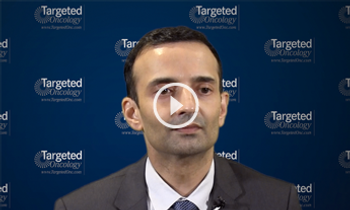Articles by Ajai Chari, MD, PhD

Dr Ajai Chari highlights the advantages of approved bispecific therapies as off-the-shelf options for patients with rapidly progressing multiple myeloma, highlighting the necessity for Phase 3 studies to confirm long-term benefits and safety. In closing, Dr Chari emphasizes the role of healthcare teams in managing side effects and complications, supporting the utility of bispecifics through unprecedented remissions and improved quality of life for patients.

Ajai Chari, MD, discusses managing toxicities in patients with relapsed/refractory multiple myeloma treated with emerging bispecific therapies, emphasizing common adverse events including cytokine release syndrome, target-related toxicities such as neutropenia, and mitigation strategies such as pre-medication, early intervention with tocilizumab, and dose modulation.

Dr Ajai Chari highlights the CARTITUDE-1 study for its impressive results in the treatment of patients with relapsed/refractory multiple myeloma, noting a high response rate after three-year updates, which led to the accelerated approval of cilta-cel therapy.

Ajai Chari, MD, details the accelerated FDA approval of talquetamab based on data from the MonumenTAL-1 study showing positive response rates in patients with advanced multiple myeloma. The study highlighted the latest efficacy results of every-two-week dosing, which demonstrated an advantageous option for patients treated with four or more lines of therapy and triple class exposure.

Dr Ajai Chari discusses the various treatments available for patients with relapsed/refractory multiple myeloma and emphasizes the paradigm-changing impact of emerging therapies.

Ajai Chari, MD, presents the case of a 71-year-old woman with relapsed/refractory multiple myeloma who showed signs of disease progression after four lines of therapy and was initiated on a recently FDA-approved bispecific antibody, talquetamab.

Ajay Chari, MD, discusses new blood testing options for patients with multiple myeloma.



